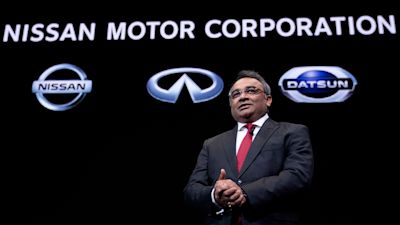Nissan boss says Brexit deal is 'positive' and 2030 ban on petrol and diesel cars 'not impossible'

The government is desperate for something upbeat to point at about Brexit. Nissan has just delivered.
The company’s chief operating operator says the trade deal that the government announced on Christmas Eve is “positive,” that all of its UK-built cars will be exempt from tariff and quotas, and that the future of its Sunderland factory - which employs 6,000 people - is now secure.Nissan had warned it would close the Sunderland site if the UK left the European Union without a free trade agreement. “[The trade deal] has brought sustainable competitiveness for our Sunderland plant, not only for the United Kingdom but for outside the United Kingdom,” Ashwani Gupta, Nissan’s COO, said.
Sunderland is Nissan’s last remaining factory in Europe - 70% of the cars assembled there are exported, most of them to the EU.
'The Brexit deal for Nissan is positive' says Ashwani Gupta
Nissan will continue to send all three of the models built at Sunderland - Qashqai, Juke and Leaf - to countries in the EU without having to pay tariffs.
Mr Gupta said that production of the 62 kilowatt battery for the Leaf will be moved from the United States to Sunderland to ensure that all of Nissan’s cars comply with so-called “Rules of Origin” set out in the trade deal.
The decision is likely to create jobs in the North East.
He also confirmed that a new “electrified” version of the Juke will go into production at Sunderland by 2023.
In 2016, the previous head of Nissan walked out of 10 Downing Street clutching a written pledge from Theresa May’s government that Brexit would not “adversely affect” Nissan’s ability to export cars to the EU.
Boris Johnson’s Brexit is a lot “harder” than the version Theresa May was pursuing.
The requirement for customs declarations will make it more expensive for Nissan to build cars at Sunderland but the company seems happy that it can make the arrangement work.
Earlier this week, the boss of Stellantis, the newly formed carmaker, warned that its Vauxhall plant at Ellesmere Port was at risk unless the UK government offers financial incentives to keep it open.
The chief executive, Carlos Tavares, is hustling for taxpayer support to offset the higher costs of Brexit and to help Vauxhall adapt production in time for the UK ban on new petrol and diesel cars by 2030.
It is striking that Nissan is not making a similar demand.
'By the end of 2023, we will be ready' says Ashwani Gupta on electrified cars target
“We see Brexit as it is 'open for all' and Nissan has the capability and the capacity to do the business by ourselves under the open book policy,” Ashwani Gupta told ITV News.
“We will follow normal business conditions offered by the UK government.”Mr Tavares also described the government’s decision to ban the sale of petrol and diesel cars from 2030 as “brutal.”
Mr Gupta was more optimistic about the chances of being able to comply.
Nissan began production of the Leaf - a fully electric car - at Sunderland in 2013.
Mr Gupta did not say when the company planned to phase out production of the internal combustion engine but insisted that hybrid versions of the Qashqai and the Juke would be rolled out by 2023.
“From our viewpoint, when we have all electrified versions by the end of 2023 - that will be seven years to go [until the ban in 2030]. So it’s not impossible.”That’s a pretty lukewarm endorsement but, in the current climate, the UK government will grab it with both hands.
Business Secretary Kwasi Kwarteng said: “Nissan’s decision represents a genuine belief in Britain and a huge vote of confidence in our economy thanks to the vital certainty that our trade deal with the EU has given the auto sector. “For the dedicated and highly-skilled workforce in Sunderland, it means the city will be home to Nissan’s latest models for years to come and positions the company to capitalise on the wealth of benefits that will flow from electric vehicle production as part of our green industrial revolution.”